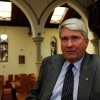Centre for Policy Development's Blog, page 106
August 28, 2011
Big Names Chase Leadership on Asylum Seeker Debate | The Power Index
Prominent business leaders have weighed into the asylum seeker debate for the first time by calling for an end to mandatory detention and greater political leadership on the issue.
Australian Industry Group chief Heather Ridout, NAB chairman Michael Chaney and businesswoman Janet Holmes a Court are among those backing A New Approach, Breaking the Stalemate on Refugees and Asylum Seekers, a report released by the Centre for Policy Development today.
Unionist Ged Kearney, former Liberal Party leader John Hewson and novelist Thomas Keneally are also among the 34 well-known Australians who have given their stamp of approval to the CPD's call for political leaders to end mandatory detention and increase Australia's refugee intake.
According to report author John Menadue, a CDP board director and former secretary of Prime Minister and Cabinet under Gough Whitlam and Malcolm Fraser, their support proves that there's widespread concern for where Australia is heading on the asylum seeker debate.
"I think there is probably a view in some people's minds that people who advocate the human rights of people suffering persecution are, if you like, the usual suspects. What these people signing on have demonstrated is that that is not the case," he told The Power index this morning.
Menadue adds that "it wasn't difficult" to get people to respond to his call to back the report.
"They're busy people but it's not hard to get them to respond to a request that we've made to them to comment on the present state of asylum refugee policy in Australia."
It's the first time business leaders have publicly backed such a far-reaching response to the asylum-seeker debate, but Menadue says this isn't because such support for a renewed focus isn't there, but rather that nobody's specifically asked such leaders for their backing.
The report comes on the tenth anniversary of the Tampa rescue and on the same day the Government's Malaysia Solution is due to be tested by a full bench of the High Court.
Written by Menadue, Arja Keski-Nummi and Kate Gauthier, the New Approach advocates the phasing out of mandatory detention for all asylum seekers within two years — with all children released by end 2011 — the creation of new accommodation centres housing better flexibility for asylum seekers who present ongoing security concerns or require intensive social support, and the appointment of an independent child guardian for unaccompanied minors.
The authors also call for savings generated by limiting mandatory detention to be channeled into English language programs and youth support services, and for Australia's annual refugee intake to be increased from 14750 to 20000 by 2016.
Menadue believes that good political leadership has all but disappeared on the issue due to the Tampa crisis, 9/11 and the emphasis on border protection. "What has happened is national security and border protection has drowned out the plea of desperate people in need of our help and protections," he says.
To read The Power Index's full report, click .
August 25, 2011
The Bloated Myth: Why Public Servants are Lean
James Whelan joined Peter Mares on ABC Radio National's The National Interest to discuss CPD's State of the Public Service: An Alternative Report.
To hear the full interview, click here.
They're a favourite object of ridicule: cardigan-wearing, pen-pushing mandarins who generate work by holding pointless meetings, only to clock off at 4.47 PM on the dot. And, of course, there's the oft-repeated view that bureaucracies are self-perpetuating organisms that grow, fungus-like, sucking up state resources wherever they can. Oh so you might think… In fact, the federal public service has the same number of staff today as it did 20 years ago, in spite of the fact that Australia's population has grown by almost 4 million people over the same period; indeed, the US spends a higher proportion of GDP on its public service than Australia. The Commonwealth bureaucracy employs 300,000 people—more or less the combined workforce of the two major supermarket chains, meaning our public service is already a lean operation. But there's room for improvement: too many chiefs (on $100,000 plus salaries) and too few Indians, with women less likely than men to be in the top brackets of pay. So, how much does the public service need to change to better serve the public?
Ben Eltham | There Is A Plot To Destroy The Gillard Government
To win office, the Government will have to perform a Herculean feat – and now the Thomson affair has given the Opposition an extra set of cudgels writes Ben Eltham.
The Australian Financial Review's Geoff Kitney had an article this week about Labor's fortunes. According to the unnamed "seniorALP figures" he interviewed, the anger towards the Labor government is now at levels comparable to the dying days of the Whitlam and Keating governments.
Things may not be quite as bad as they were in 1975 or 1996 yet, but there's no denying the depths of Labor's opinion poll woes. Yes, recent polls show Labor's support is no longer falling — but the problem is the polls have stabilised at figures that will see Labor wiped from office. The scale of the mountain the government must climb in the two years before the next federal election must daunt even the hardiest true believer. As we know, there are precious few of these left on the Labor backbench.
The reasons for the government's malaise have been raked over many times. The nature of Julia Gillard's ascension, her non-victory in last year's election, and her subsequent minority government mean that many voters have never regarded her as a legitimate prime minister. You can add to the list a hostile media and plenty of own goals when it comes to government tactics and communications strategies. Throw in some unpopular policies like the carbon tax and it's no surprise the government is struggling.
Even so, Labor's ill fortune has begun to feed on itself. Call it a downward spiral, call it a a self-sustaining loop: the perception that Labor simply can't win the next election has begun to take hold, not just among political insiders, but increasingly in the minds of ordinary voters. And who can blame them, given the way the government has been performing?
And now, just for good measure, the government is mired in an old fashioned sex scandal, thanks to embattled backbencher Craig Thomson and his wayward credit card.
The whys and wherefores of Thomson's pre-parliamentary career at the head of the powerful Health Services Union are the subject of increasingly febrile speculation. Briefly, Thomson's tenure was marked by approximately $100,000 in missing union funds, which current Health Services Union secretary Kathy Jackson claims have not been paid back. Thomson continues to deny any wrong-doing, and the matter has now been referred to New South Wales police. No charges have been laid.
The possibility of white-collar crime at a prominent union is a serious matter, certainly. But it is hardly a matter that we would expect to convulse federal parliament for an entire week if Julia Gillard's government wasn't utterly dependent on Thomson's seat.
But Gillard's survival does depend on every single ALP member, plus three independents and a Green, so any potential threat to a sitting member is taken very seriously — seriously enough for the NSW branch of the ALP to pay $90,000 of Thomson's legal debts, lest he be forced into bankruptcy and become disqualified from office.
The knife-edge parliamentary numbers also explain the ruthless pursuit of Thomson by the Opposition, which has again scented blood. Of course, any opposition enjoys a government scandal, particularly one complete with juicy details about mobile phone records and signatures on receipts for services at a bordello. It has been Thomson's misfortune to attract the interest of Liberal Senator George Brandis, a former barrister and one of the sharpest legal minds in federal politics. Brandis has been diligently trawling through the evidence in a forensic manner, making sure to read everything he has uncovered into the Senate Hansard to ensure that it's covered by parliamentary privilege.
Whether Thomson is guilty, innocent, or even entitled to the presumption of innocence is of course irrelevant to the bigger picture, as far as the Coalition is concerned. And the bigger picture is quite simple: even if Thomson is not charged, the imbroglio keeps the government on the back foot and scandal on the front page.
There are some bigger questions for Labor to answer here, perhaps most pointedly in regards to the continuing influence of powerful unions in the apparatus of the Labor party machine. As long as trade unions an be used, even in the narrowly legitimate sense, as slush funds and power bases for those with parliamentary ambitions, and as long as union officials can continue to be parachuted into seats to sit at the pleasure of their factional godfathers, the ALP will continue to experience embarrassments such as the Thomson affair. After all, the right-wing factions that run the New South Wales branch of the ALP and that installed Thomson in Dobell are the very same factional warlords that control the numbers for Julia Gillard in federal caucus.
That shouldn't stop us from asking the obvious question about whether the issue is really as interesting and relevant as the mainstream media has been making out. Much of the speculation about Thomson — even here in New Matilda — has been over the top. For instance, Ben Raue spent several paragraphs wondering about the implications of a by-election in the seat of Dobell. But there is no sign that Thomson is going to resign his seat any time soon.
Yes, a police investigation is under way, aided by a friendly courtesy call from Senator Brandis to New South Wales Police Minister Mike Gallacher. But even if he is charged eventually, Thomson will undoubtedly defend himself vigorously. The whole sorry saga will wind its way through the courts for years. The Gordon Nuttall scandal in Queensland is a good example of how long it can take. By the time Craig Thomson finally has his day in court — assuming he even has a case to answer — we could be well into 2013 and Tony Abbott may be happily ensconced in the Lodge already.
However, the controversy does seem to have had one unexpected effect. Goaded once too often, and perhaps finally desperate enough to throw caution to the winds, federal Labor has apparently decided to go on the attack. This week saw several intemperate outbursts by manager of government business Anthony Albanese (who at one stage memorably called the truckie's protest the "convoy of no consequence"), followed yesterday by a calculated counter-attack by the Prime Minister herself.
Perhaps deciding that Labor's current strategy of simply taking punishment was not working, Julia Gillard rose to her feet on Thursday and launched an all-out assault on the Opposition, accusing the Coalition of "stinking hypocrisy" and pointedly referring to the criminal theft and assault charges against Liberal Senator Mary Jo Fisher.
Gillard pointed out her government has passed 185 pieces of legislation, including 22 in the past fortnight that has been dominated by the Thomson affair. "They pursue their self-interest and hypocrisy day by day and it is truly disgusting," she shouted, claiming "the Opposition has simply focussed its sights on destroying the government".
Gillard is right: the Opposition has focused its sights on destroying the government. The problem is, aided by some all-too-typical Labor incompetence, they're doing a rather good job of it.
August 23, 2011
John Menadue | Asylum seeker facts lost in hysteria
Does our island mentality and concern about securing our physical border help explain our obsession with "boat people"?
John Menadue explores the causes of Australia's obsession with asylum seekers and boat people. As we seem to have lost all sense of proportion in this debate, we should adopt the metrics the UNHCR does. That is, what should matter is the total number of refugees, regardless of how they arrive.
As we've entered a post-truth politics era, where the media are mere arbiters of opinion, it helps to establish some facts on asylum seekers.
 Read the full CPD report, A New Approach: Breaking the Stalemate of Refugee & Asylum Seekers here.
Read the full CPD report, A New Approach: Breaking the Stalemate of Refugee & Asylum Seekers here.
A New Approach comprehensively critiques Australia's refugee and asylum policies and finds they are inhumane, ineffective and expensive.
To read John's full article, click here.
Ben Eltham | Mining Boom Blasts Jobs
First Qantas, now BlueScope. These big job losses have nothing to do with the carbon tax and everything to do with high commodity prices. Ben Eltham on the other consequences of the mining boom.
Originally produced at New Matilda.
It was a devastating blow for the Illawarra. The closing of blast furnace 6 at BlueScope Steel's iconic Port Kembla steel works brings to end steel exports from Wollongong and means 1,100 job losses.
Last week it was Qantas, announcing 1,000 job cuts despite a $250 million dollar profit.
Both companies blamed the high Australian dollar and fierce overseas competition for their decisions. And what's causing the high Australian dollar? It's the mining boom, stupid.
All of a sudden, the so-called "Dutch Disease" has moved from an obscure topic of debate for academic economists to the forefront of Australia's political discussion. As New Matilda readers will know, we've been warning of the threat of a high Aussie dollar to Australia's export industries for some time. So has the ABC's Stephen Long. As long ago as March last year he interviewed BIS Shrapnel's chief economist Frank Gelber, who warned that "we're setting ourselves up for a huge fall if at some stage we see falls in minerals prices".
The crux of the issue is of course those sky-high commodity prices. With Australia's terms of trade (the ratio of the price of our exports to the price of our imports) at their highest levels since the gold rush of the 1850s, Australian consumers have never found it easier to buy overseas goods. The Reserve Bank's boss Glenn Stevens has a nifty analogy. He likes to compare how many flat-screen televisions can be purchased with the proceeds from a tonne of iron ore. As Stevens put it in a speech last year, "to put it in very oversimplified terms, five years ago a ship load of iron ore was worth about the same as about 2200 flat-screen television sets."
By December last year, Stevens observed, that ship load of iron ore was worth "about 22,000 flat-screen TV sets — partly due to TV prices falling but more due to the price of iron ore rising by a factor of six".
Those terms of trade are driving up Australia's currency, and making it desperately hard for export industries like BlueScope's steel exports or Australia's universities and English-language colleges to compete. The disease affects not just pure exporters, but also businesses that compete with imports, like manufacturers of solar cells for the domestic market. As Tim Colebatch observed pointedly today in The Age, the resources boom forces Australians to confront the question "does it matter to Australia if we have a steel industry or not?"
In point of fact, our key economic policymakers have already made up their minds. Their answer is no, Australia does not need to keep making steel, or cars, or anything else. The wealth of the mining boom means we can buy those things from Asia more cheaply than we can make them here.
In his speech last year, Stevens went on to argue that "the general point is that high terms of trade, all other things equal, will raise living standards, while low terms of trade will reduce them". This, in a nutshell, is the dominant view of Australia's economic boffins. In other words: relax, the mining boom is a good thing for most of us.
The Treasury, for instance, devoted a considerable amount of space in this year's Budget Papers to the issue of the Dutch Disease. The Treasury economists examined the economic data and literature — including of the Netherlands itself — and concluded that "there is no evidence that Dutch disease reduces overall economic growth". Yes, some sectors of the economy do suffer. But other sectors can actually piggy-back on the resources boom to improve their prospects, for instance by selling advanced mining engineering skills and technologies to other countries. "Resource sectors in advanced economies tend to be highly skilled and generate their own spillovers — stimulating other industries as well as driving opportunities for long term economic growth," Treasury wrote.
The Reserve bank agrees. As the RBA's deputy Ric Batellino said at a conference yesterday, "people understand that basically overall the boom is good for the economy, but there's parts of the economy that do suffer as a result of it because of the structural changes that take place."
Looked at from the perspective of economic orthodoxy, the restructuring taking place at BlueScope right now is simply an inevitable result of the uncompetitive nature of trying to export steel when other parts of the world can make it much more cheaply than we can. Perhaps this is why the government appears to have been caught so off guard by the BlueScope announcement, which any sensible government should have long been preparing for.
The announcement of a smallish $30 million package for the Illawarra economy, plus $100 million in cash for BlueScope, appears to be a hasty and ill-considered response to a serious economic shock for the region. As the Australian Financial Review's Chanticleer column pointed out yesterday, the so-called "Illawarra Region Innovation and Investment Fund" appears to ignore the main driver of employment in the region, the University of Woolongong, which should surely sit at the centre of any integrated regional plan for the local economy.
But perhaps that's because the government's main policy response to the mining boom was throttled at birth. Treasury's answer of what to do about the mining boom was the original Resource Super Profit Tax, which the mining industry so effectively attacked last year. The RSPT as it was originally put forward would have been a very broad tax on the super-profits of mineral resources, and would have used the proceeds to give non-mining industry businesses a tax cut, as well as boosting Australian retirement incomes through superannuation.
What you think of the merits of the RSPT is essentially irrelevant now, because of the devastating campaign against it by the mining industry and its cheer-leaders in the Coalition and media. As a result, the Gillard government is still trying to legislate for a paler, weaker version called the Minerals Resource Rent Tax. This will bring in far less revenue and accordingly direct far fewer of the proceeds of the mining boom into national investments. It was a massive win for the big multinational miners, and a loss for the Australian community at large. Mining profits, meanwhile, continue to soar.
The consequences of the mining boom are in fact felt most keenly in those parts of the country which play host to huge mining developments. It's not just the crazy rents and incipient social problems of places like Port Hedland, or the difficulties that nurses and ambulance drivers have finding affordable accomodation in Perth. Australians are also beginning to realise that the mining boom will necessarily involve a level of economic restructuring that few of us were ever asked about.
As a result, many of us are waking up to the fact that the huge resources projects going ahead in Queensland and Western Australia may mean real pain ahead for the many workers and small businesses caught in the cross-fire of a soaring dollar and uncompetitive local industries. As Mark Bahnisch blogged yesterday, "what we will no doubt continue to see is far from some sort of painless and necessary 'structural adjustment' — unless our destiny in a globalised economy is indeed to be a quarry. That's very far from the vision of value-added manufacturing, innovation and smart services that accompanied the opening up of Australia's economy by Labor in the 1980s and 90s."
One thing's for sure: when push comes to shove, ordinary workers will miss out long before any executives are forced to walk the plank. BlueScope CEO Paul O'Malley, for instance, received a $720,000 bonus for the year to June — the same year that BlueScope lost a billion dollars in the run up to the decision to lay off 1,100 workers. A BlueScope spokesperson told the Illawarra Mercury that one reason for O'Malley's bonus was "the retention of cost reductions achieved in 2010″. Rewarding a CEO for "cost reductions" is a nice way to spin a bonus for retrenching workers.
Prominent Australians urge political leaders to break the stalemate on refugees and asylum seekers
Australia needs a circuit-breaker in our treatment of people seeking asylum from war and persecution.
On the tenth anniversary of the MV Tampa's rescue of 438 asylum seekers from their distressed vessel Palapa 1, Australia's asylum and refugee policy is still sadly characterised by human tragedy, political opportunism, policy failure and great cost.
People seek asylum here have been the subject of an increasingly contentious public and political discussion. A toxic debate has polarised large sections of the Australian community and paralysed politicians of most persuasions from engaging in constructive dialogue. Misrepresentation is rife. We have reached a stalemate.
It was not always this way. Leaders of the past like Ben Chifley, Arthur Calwell, Malcolm Fraser and Ian MacPhee appealed to our better angels. We responded grudgingly to begin with and then quite charitably to large refugee flows.
We are now rightly proud of the great contributions which the 700 000 refugees who have come here since the Second World War have made to this nation. Australia's generosity has been handsomely reciprocated. Refugee resettlement has been a great success story. We should not forget it.
We must break the current impasse, which has strangled our ability to move towards principled and effective responses. A return to constructive bi-partisanship would benefit our nation greatly.
The Centre for Policy Development's A New Approach – Breaking the Stalemate on Refugees and Asylum Seekers report sets out a pathway to advance Australia's national interest by assuring that the claims of asylum seekers to Australia's protection are considered rigorously but with compassion.
The report proposes a series of actions with the potential to achieve tangible policy progress. These measures aim to ensure Australia:
Adheres to all international conventions which we have voluntarily signed
Quickly and correctly identifies those who are refugees and grants them protection consistent with UNHCR policies and guidelines
Protects Australians from any health or security concerns
Discourages dangerous journeys, but treats fairly those who have made those journeys
Affords all people in Australia their human rights, as well as access to the legal systems which deliver them, and
Rapidly returns home in safety and dignity those who are found not to be in need of Australia's protection.
A New Approach outlines steps for improvement in five main areas. By supporting the spirit of these recommendations we hope that good policy will again make good politics.
Recommendations to the Commonwealth Government
Restructure the debate on national security and asylum.
Establish an independent and professional commission with a small secretariat and budget to facilitate informed public debate about refugee and asylum issues in Australia.
Establish an independent Refugee, Asylum and Humanitarian Assistance Authority to administer the policy and programs that fall under Australia's offshore and onshore humanitarian programs, underpinned by legislation that clearly articulates the values, principles and objectives of Australia's refugee and asylum policies. This Authority will contribute to a better balance between humanitarian and national security issues.
Engage fully within the region.
Support the establishment of a well-resourced policy unit (within the Bali Process Secretariat) backed by diplomatic efforts, to work with regional governments and civil society organisations in developing the key elements of a regional cooperation and protection framework based on burden sharing.
Refocus Australia's offshore humanitarian program.
Increase our annual refugee intake from 14 750 to 20 000 by 2016. As a first step towards this target, de-link the counting of asylum numbers in Australia from the offshore resettlement program.
Revise the refugee referral and selection policies and practices, with unity of the surviving family as a priority for resettlement.
Work with UNHCR to re-prioritise referred refugee resettlement, to:
address durable solutions for protracted refugee situations in the region,
respond to the growing issue of displacement within countries, such as Sri Lanka and Afghanistan.
Create a new approach to asylum policy in Australia.
Phase out mandatory detention for all asylum seekers regardless of their manner of arrival and including currently excised locations, transitioning to a risk-based detention policy within two years. This approach will quickly determine who should continue to be detained according to security and character assessments. It will also end the prolonged use of Christmas Island and involve a repeal of the excision laws.
Refocus the legal framework for detention to match the mainstream legal framework for all other forms of detention in Australia. This means making all detention decisions subject to external scrutiny and judicial review.
Use detention specifically for mandatory health, identity and security checks, with a 30 day time limit for adults and a 14 day time limit for children.
Create new accommodation centres with greater flexibility for people who present ongoing security concerns or require intensive social support. These should be in urban or regional hub locations for ease of service delivery, better oversight and reduced cost.
Appoint an independent child guardian for Unaccompanied Minors in the immigration regime, to ensure that minors have a legal guardian to represent their interests.
Release all children (and their carers) from mandatory detention before the end of 2011.
Reallocate funds to the initial settlement needs of refugees.
Reallocate most of the savings from reform of detention to priority settlement services, particularly English language programs and youth support services.
See below for list of all endorsers.

Professor Frank Brennan SJ AO. "We Australians are still all at sea seeking to find an asylum policy which is workable, economic, legal, politically saleable and above an agreed moral bottom line. The report, A New Approach, from the Centre for Policy Development deserves consideration as a conversation starter and a prospective circuit-breaker."

Heather Ridout, Chief Executive of the Australian Industry Group. "The new approach to refugees and asylum seekers proposed by the Centre for Policy Development deserves widespread community support and should be given serious consideration across the political spectrum. With genuine political will there is no reason why Australia cannot move away from the corrosive and divisive state of the current debate and back to the bipartisan approach which served Australia so well for so long."
 John Hewson, AM. Leader of the Liberal Party of Australia (1990 – 1994).
"This is an issue that should be above and beyond politics, not one to be exploited in a mindless, short-term political race to the bottom, the "winner" being the toughest and most inhumane to those who are predominately desperate people fleeing war and persecution in search of a new life for themselves and their families."
John Hewson, AM. Leader of the Liberal Party of Australia (1990 – 1994).
"This is an issue that should be above and beyond politics, not one to be exploited in a mindless, short-term political race to the bottom, the "winner" being the toughest and most inhumane to those who are predominately desperate people fleeing war and persecution in search of a new life for themselves and their families."

Samah Hadid, Human rights activist and former Australian Youth Representative to the United Nations. "The Centre for Policy Development's report 'A New Approach– Breaking the Stalemate on Refugees and Asylum Seekers' is exactly the fresh and comprehensive approach that is needed in this policy debate. This report is the circuit breaker refugee advocates and policy makers have been looking for."
Gideon Haigh, Journalist. "Australia's policies for the treatment of refugees are tired, cynical, populist and punitive. I wholeheartedly support the CPD's thoughtful, comprehensive and realistic proposals, in the belief they will enhance the contribution this country makes to the alleviation of a worldwide problem."

Tuong Quang Luu, AO. Director, ActionAid Australia and Head of SBS Radio (1989-2006). "As a former Vietnamese refugee who survived his escape on a waxed bamboo b asket in the Gulf of Thailand, I would never suggest to anyone to risk their life on u nseaworthy boats to Australia. But asylum seekers hardly have choices and those who survive their horrific journey should be treated with compassion while their claim to refugee status is considered. In my view, the Centre for Policy Development's Recommendations to the Commonwealth Government, which I fully endorse, represent a balanced and sensible solution to the difficult and often misunderstood issues of boat people and border protection. If approved, Australia would not only restore its internationally-recognised reputation as a humanitarian civil society but could also maximise its human and financial assets."
Carmen Lawrence, Former Premier of Western Australia (1990 – 1993). "Long-term detention of asylum seekers fleeing persecution not only violates their human rights, but also severely damages their health, resulting in further trauma, depression, self-harm and profound psychological damage."
[image error]Read the full CPD report, A New Approach: Breaking the Stalemate of Refugee & Asylum Seekers here.
A New Approach comprehensively critiques Australia's refugee and asylum policies and finds they are inhumane, ineffective and expensive.
The Centre for Policy Development and the authors would like to thank all the individuals who donated generously to make this report possible.
A New Approach: Breakig the Stalemate on Refugees & Asylum Seekers is supported by:
Ian Anderson, AM. Board member, Oxfam Australia and Founding Chair of Australians for Just Refugee Programs (2002-2005). David Block, AC. Julian Burnside, AOQC. Frank Brennan, AO SJ. Professor of Law, Public Policy Institute, Australian Catholic University. Bryan Brown, AM Actor. Michael Chaney, AO. Chairman, National Australia Bank, Woodside Petroleum and Gresham Partners. Gervase Chaney President, Paediatrics and Child Health Division of the Royal Australasian College of Physicians. Angela Chaney Member of the Coalition for Asylum Seekers, Refugees and Detainees. Fred Chaney, AO. Former Liberal Minister and Member of the Coalition for Asylum Seekers, Refugees and Detainees. John Gibson President of the Refugee Council of Australia. Kerry Goulston, AO. Emeritus Professor, Sydney Medical School at the University of Sydney and Consultant Physician. Samah Hadid. Human rights activist and former Australian Youth Representative to the United Nations. Gideon Haigh Journalist. John Hewson, AM. Leader of the Liberal Party of Australia (1990 – 1994). Janet Holmes a Court, AC. Chair, Heytesbury. Ged Kearney President, Australian Council of Trade Unions. Thomas Keneally, AO. Novelist, playwright and author. Carmen Lawrence Director of the Centre for the Study of Social Change at the University of Western Australia, and Premier of Western Australia (1990 – 1993). Tuong Quang Luu, AO. Director, ActionAid Australia and Head of SBS Radio (1989-2006). Ian Macphee, AO. Minister for Immigration and Ethnic Affairs (1979 – 1982). Ian McAuley. Adjunct Lecturer at the University of Canberra and Fellow at the Centre for Policy Development. Wendy McCarthy, AO. Executive Director, McCarthy Mentoring. Hugh Mackay, Psychologist, social researcher and writer. Sir Gustav Nossal, AC CBE. Emeritus Professor, The University of Melbourne. Chris Masters, Journalist and author. Roy Masters, Sports journalist and former rugby league coach. George Miller, AO. Filmmaker – Mad Max, Babe, and Happy Feet. Melissa Parke, MP. Federal member for Fremantle. Neville Roach, AO. Former Chairman of the National Multicultural Advisory Council, Council for Multicultural Australia and Business (Migration) Advisory Panel. Heather Ridout. Chief Executive, Australian Industry Group. Margaret Sixel. Film editor – Mad Max, Babe, and Happy Feet. Richard Tognetti, AO. Artistic Director, Australian Chamber Orchestra. David Williamson, AO. Playwright and Screenwriter. Kristin Williamson, Novelist and Biographer.
August 22, 2011
Kerry Murphy | Improving the Refugee Debate
During the week of the tenth anniversary of the Tampa, and following the release of A New Approach, Breaking the Stalemate on Refugees and Asylum Seekers, Kerry Murphy comments on the pressing need to move the asylum seeker debate 'from one aimed at the lowest common denominator, to one based on the 'better angels of our nature'.
With the High Court inquiry into Prime Minister Gillard's Malaysian Solution and the parliamentary inquiry into self-harm and suicide in asylum seeker centres, the impetus for change in Australia's asylum seeker policy is reaching critical mass.
To read Kerry's article on a few alternatives to Australia's "stop the boats" approach, click here.
Frank Brennan | 'Breaking the stalemate on refugees and asylum seekers'
Endorser of our recent report, A New Approach: Breaking the Stalemate of Refugee & Asylum Seekers, Professor Frank Brennan writes for ABC's The Drum on what he thinks about the vexed state of policy debate on refugees and asylum seekers.
We Australians are still all at sea seeking to find an asylum policy which is workable, economic, legal, politically saleable and above an agreed moral bottom line.
The contested issues are offshore processing and onshore detention.
This week the High Court will have a look at the legality of the latest scheme for the treatment of asylum seekers arriving by boat. This time it will be the Gillard Government's "Malaysia solution" under the judicial spotlight.
Read the full opinion piece here.
 Read the full CPD report, A New Approach: Breaking the Stalemate of Refugee & Asylum Seekers here.
Read the full CPD report, A New Approach: Breaking the Stalemate of Refugee & Asylum Seekers here.
A New Approach comprehensively critiques Australia's refugee and asylum policies and finds they are inhumane, ineffective and expensive.
Sky News | 'Report suggests new approach to refugees'
Sky News Online reports on the findings in A New Approach, our suggested policies on refugees & asylum seekers:
The report – A New Approach: Breaking the Stalemate on Refugees and Asylum Seekers – has been endorsed by 34 prominent Australians, including former Liberal Party leader John Hewson, author Thomas Keneally and former immigration minister Ian Macphee.
Among its 13 recommendations, the paper says mandatory detention should be phased out within two years and Australia's annual refugee intake should rise from 14-thousand-750 a year, to 20-thousand by 2016.
It also recommends an end to detention for children and their carers by the end of this year, replaced with a 30-day detention (14 days for children), for mandatory health, identity and security checks.
Read the full article at Sky News Online here.
 Read the full CPD report, A New Approach: Breaking the Stalemate of Refugee & Asylum Seekers here.
Read the full CPD report, A New Approach: Breaking the Stalemate of Refugee & Asylum Seekers here.
A New Approach comprehensively critiques Australia's refugee and asylum policies and finds they are inhumane, ineffective and expensive.
Belinda Merhab | 'Report seeks new approach to refugees'
AAP News journalists today reported on CPD's Refugee paper, quoting prominent Australian Tuong Quang Luu's story of fleeing Vietnam.
"It was an extremely hazardous and horrible experience," he said.
"It's very difficult for people living in ordinary society, a peaceful society like Australia, to understand because asylum seekers and refugees do not have choices. You have to take risks to survive."
The report – A New Approach: Breaking the Stalemate on Refugees and Asylum Seekers – has been endorsed by 34 prominent Australians including former Liberal Party leader John Hewson, author Thomas Keneally and former immigration minister Ian Macphee.
Mr Hewson said this was an issue that should be above politics, "not one to be exploited in a mindless, short-term political race to the bottom, the `winner' being the toughest and most inhumane to those who are predominately desperate people fleeing war and persecution".
Read full story at in The Sydney Morning Herald here.
 Read the full CPD report, A New Approach: Breaking the Stalemate of Refugee & Asylum Seekers here.
Read the full CPD report, A New Approach: Breaking the Stalemate of Refugee & Asylum Seekers here.
A New Approach comprehensively critiques Australia's refugee and asylum policies and finds they are inhumane, ineffective and expensive.
Centre for Policy Development's Blog
- Centre for Policy Development's profile
- 1 follower





